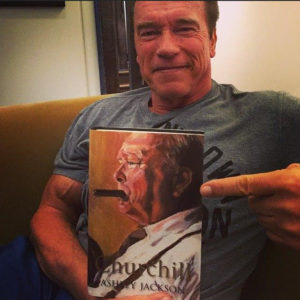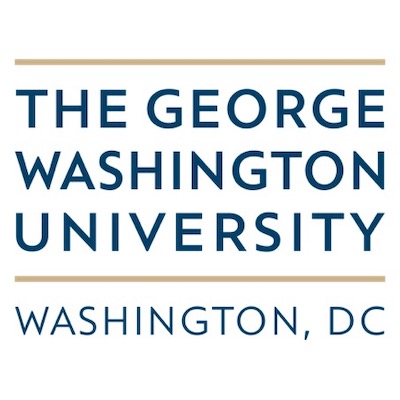
Bulletin #154 — Apr 2021
Churchill Studies in DC

April 5, 2021
By NATALIA DINELLO, CHARLSIE KING and JUSTIN REASH
Sir Winston Churchill told James Humes, a future US presidential speechwriter: “Study history, study history. In history lies all the secrets of statecraft.” This Churchillian quote served as the starting point for The George Washington University’s Graduate School of Political Management (GSPM) spring 2021 Global Perspectives course. Titled Strategy and Statecraft: Churchill and the Evolution of the Modern United Kingdom, the course was held in partnership with the International Churchill Society (ICS) and the National Churchill Leadership Center (NCLC), the latter housed within GW’s Gelman Library in Washington, DC.
GSPM trains future political leaders, advocates, and communicators to wield power ethically and professionally. Classes combine political science findings with real-world best practices. Thus, studying the strategies and statecraft of Churchill proved enlightening and instructive for our globally minded students. As a great statesman and a brilliant communicator, the “roaring lion”, Churchill offers many practical professional lessons. In addition, his successes and failures invite an exploration of ethics—accounting for the customs of his time as well as the norms and values of today.
In preserving Churchill’s historic legacy, ICS and NCLC address their much-valued work to current and future generations of leaders. Arming those in charge of the future with the Churchillian “weaponry”—unequivocal aspirations for freedom, struggles against tyranny, and expressiveness in ideas and policies—is at the core of the ICS-NCLC-GSPM partnership.
The online program, which ran in March, involved interactions with highly respected historians—Andrew Roberts and Christopher Collins; current and former members of UK’s parliament—Dame Eleanor Laing, Damian Collins, and Laura Sandys; political scientists and consultants—Karin von Hippel, Jonathan Eyal, Neil McLennan, and Pierre Saglier; authors and public relations experts—Celia Sandys, Atul Singh, Alastair Stewart, and David Gallagher and his colleagues; and museum researchers and curators—Antonia Keaney and Katherine Carter. Assembling such a diverse and intellectually strong program would not have been possible without Allen Packwood, director of the Churchill Archives Centre, Churchill College at Cambridge. We also owe much gratitude to Lee Pollock, former ICS executive director and current trustee and advisor to the board, who first saw the potential of this partnership.

2024 International Churchill Conference
Student testimonies speak for themselves and highlight unanimous appreciation for a “fantastic journey” guided by “excellent speakers.” According to Karan Sinha, an India native and aspiring political leader, “It was a life-changing opportunity.” Martin Pittman, a political communications professional living in New York, stated, “the program deepened my professional growth.” With many glowing reviews of the course and our speakers, we noted a few themes that were gleaned from Churchill’s experience and legacy.
“Bang On”: Resilience, Tenacity, and Persistence are the Hallmarks of Strong Leaders
As a war-time leader, Churchill called for defiance of the enemy, confronted danger and did not shy away from difficulties, never “giving in” or giving up. In times of a protracted global health emergency, severe economic crisis, and political polarization, we are inspired and comforted by Churchill’s momentous statements, such as, “We shall not fail or falter. We shall not weaken or tire.” More so, we are inspired by his grit in action.
As a politician and a prolific writer, Churchill offered practical examples of “hard, hard work,” self-discipline, and endurance—the qualities needed as much today as ever. As a complicated person, he had much to overcome in his long life: his lack of university education, the hostility of critics, negative judgments of his character, and excruciating electoral losses. He also had to overcome personal pain—both as a loving father who survived two children and a leader falling from grace after wrong decisions.
Like Churchill, we are proud of the GSPM students who have persevered through the ongoing troubles. Some in the GSPM community have experienced the deaths of loved ones, the loss of jobs, and financial difficulties. But they neither “flagged nor failed,” they did not weaken or surrender. Instead, they mobilized their energy and minds, persisted in their studies, and continue to search for new opportunities. In a way, coming together weekly for our live sessions and being inspired by numerous academics and practitioners from across the pond has helped us to carry on.
Holding Fast to Our Convictions: Leadership is Not a Popularity Contest
We had an extensive discussion of Sir Winston’s advice to the Duke of Marlborough: “Never confuse leadership with popularity.” Churchill often went against the grain, confronting orthodoxy in the name of innovation. His warnings about the existential threats of Bolshevism and Nazism earned him mockery as being excessively alarmist and out-of-touch and condemning him to a decade “in the wilderness,” out of government and out of favor. In the end, history has proven that Churchill was right in his outspoken opposition to tyranny. But in our age, with its cult of celebrity and cancel culture, are there many people who would venture to express views openly that go against public opinion du jour? For our students, it was important to discuss pragmatic and ethical choices related to popularity versus principled leadership.
Our program also examined Churchill’s oratory beyond his most memorable lines. In his interactions with students, Allen Packwood explored historical contexts, intended audiences, and objectives of speeches as well as literary and rhetorical devices used by Churchill. In a practical exercise following Mr. Packwood’s session, students had to don the hat of speechwriter and conceive their own piece on modern UK governance and leadership. While learning tips on effective communication—including those from Churchill‘s “The Scaffolding of Rhetoric”—students developed their skills for crafting a powerful and impactful speech, building confidence in their ability to give voice to their convictions.
“Eating Your Words”: Strive Not for Perfection but for Growth
Churchill was no stranger to controversy. He referred to Mahatma Gandhi as “a seditious Middle Temple lawyer,” and a “half-naked fakir.” These pejorative labels have never been forgotten—in India or elsewhere. Churchill’s exaggerated denunciation of the Labour Party as totalitarian and “some sort of Gestapo” during the 1945 electoral campaign hurt him more than his opponents. His efforts to perpetuate the colonial powers of the British Empire, strong opposition to the Independence of India Bill, and mourning of the glory days of “the Empire lost” earned him a lasting reputation as an imperialist. Some may look back on Churchill’s legacy and identify many examples of “what not to do or say” but, in evaluating Churchill’s controversial positions and actions, we do not seek to label the man as perfect.
In their final assignment, students were required to write about Churchill’s legacy, including some of its darker pages. Despite having the privilege of a modern lens for which to reflect, it is imperative to consider Churchill’s identity as a child of the Victorian era and seek truth. For instance, Alastair Stewart, a writer and public affairs consultant, debunked the myth that Churchill hated Scotland, a commonly held misnomer. Neither baseless tarnishing of Churchill’s image nor its unjustified embellishment serves to maintain his historic legacy. As reminded by historian Andrew Roberts, it is the reliance on archival data that prevents the proliferation of misconceptions and ensures accurate assessments of historical figures and developments. Certainly, Churchill would agree.
At the end of his life, Churchill acknowledged that he has “often had to eat [his] words”—recognizing that he was not always in the right. But with his quintessential humor, he added that he had “always found it a wholesome diet.” It was not our intention to determine whether Churchill was a hero or a villain. We set out to learn about him and from him, accepting the political history as it happened and making inferences that may lead to a better future. In our pursuit of knowledge, we were following one of the dictums of the great man: “If we open a quarrel between the past and the present, we shall find that we have lost the future.”
As we reflect on the takeaways of our program, we also look forward to the further strengthening of the ICS-NCLC-GSPM partnership—to continue mastering and internalizing Churchill’s lessons on strategy and statecraft for a brighter future.
Natalia Dinello is the Director of the Global Residencies Program at GSPM; Charlsie King is the Program Associate, Global Perspectives Residency and Programs at GSPM; and Justin Reash is the Executive Director of the International Churchill Society and Program Director of the National Churchill Leadership Center at GW
Subscribe
WANT MORE?
Get the Churchill Bulletin delivered to your inbox once a month.




